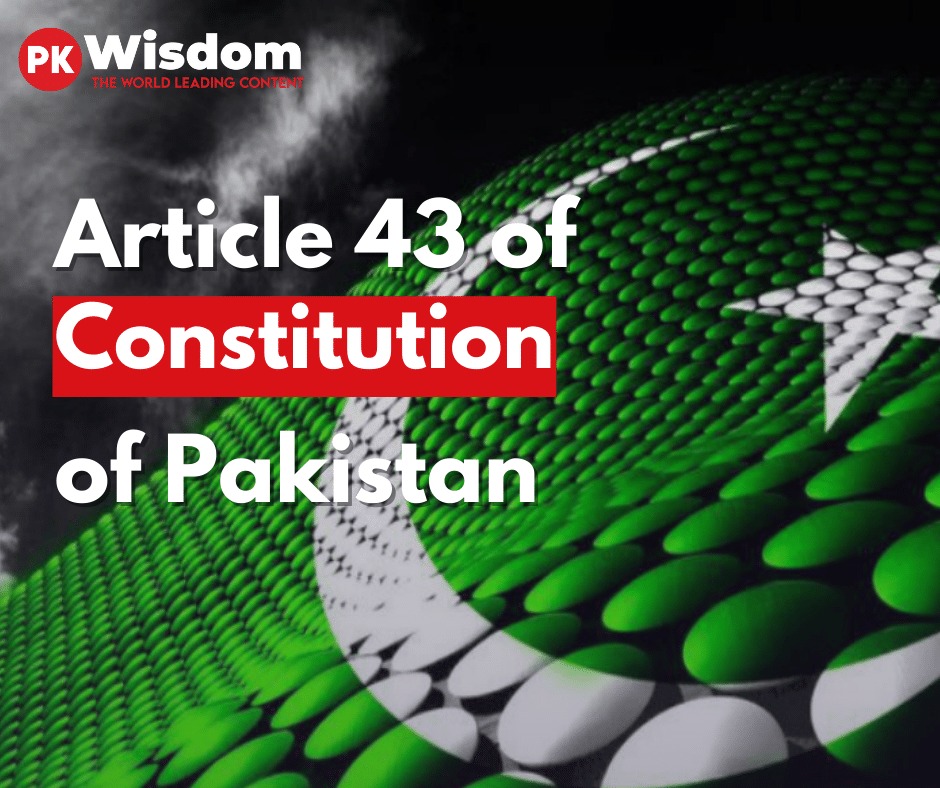Overview of Article 43 of the Constitution of Pakistan
The Constitution of Pakistan, promulgated in 1973, serves as the guiding document that establishes its governance, rights, and obligations. Article 43 plays an instrumental role by outlining specific conditions and restrictions placed upon the office of President of Pakistan. We will explore its intricate details herein this blog post as we discuss its relevance to Pakistan’s constitutional landscape.
Article 43 States
43. Conditions of the President’s Office
- The President shall not hold any office of profit in the service of Pakistan or occupy any other position carrying the right to remuneration for the rendering of services.
- The President shall not be a candidate for election as a member of Majlis-e-Shoora (Parliament) or a Provincial Assembly; and, if a member of Majlis-e-Shoora (Parliament) or a Provincial Assembly is elected as President, his seat in Majlis-e-Shoora (Parliament) or, as the case may be, the Provincial Assembly shall become vacant on the day he enters upon his office.
The first clause explicitly prohibits the President from concurrently holding any government position or engaging in any role that involves financial compensation for services rendered. The intent behind this stipulation is to ensure that the President’s primary allegiance is to the nation and its people, free from any potential conflicts of interest.
The second provision articulates the political constraints imposed on the President. It mandates that the President cannot simultaneously hold a parliamentary or provincial assembly seat. If an existing member of parliament or a provincial assembly is elected as President, they must vacate their legislative position on the day they assume the presidential office.
Key Points of Article 43 of the Constitution of Pakistan
For a full grasp of Article 43’s significance, it is imperative that one understand its key aspects:
- Presidential Independence: The first provision stresses the President’s need to remain free from other governmental roles, to preserve his or her independence and ensure decisions made aren’t affected by positions within government that can benefit financially.
- Conflict of Interest Mitigation: By restricting the President from holding other financial interests positions, the constitution helps mitigate potential conflicts of interest that could compromise his impartiality and commitment to the nation’s welfare.
- Political Neutrality: The second provision bolsters the principle of the President’s political neutrality by mandating that they refrain from participating actively in legislative proceedings, thus maintaining separation between executive and legislative branches of government.
- Vacancy in Parliamentary Seats: When elected Presidents vacate their legislative seats to assume non-partisan and impartial roles, this increases separation of powers in Pakistani politics and enhances separation of powers.
Download the Constitution of Pakistan in PDF
Crux of Article 43 of the Constitution of Pakistan
Article 43 of Pakistan’s Constitution serves a variety of key purposes; among them are:
- Favouring Presidential Integrity: By prohibiting Presidents from engaging in activities that might compromise their objectivity or integrity, Article 43 helps promote an open, ethical presidency.
- Separation of Powers: This article underscores the need for separation of powers among executive, legislative, and judicial branches – creating an important check and balance system essential to democratic governance.
- Protecting National Interests: These provisions help ensure the nation’s interests by assuring that its president is dedicated solely to serving Pakistan and its people without taking personal or financial considerations into account.
- Promoting Impartiality: Article 43 encourages impartiality and fairness in Pakistan’s political landscape by giving President Zardari the ability to serve as an unifying figure that transcends party affiliations.
Conclusion: Article 43 of the Constitution of Pakistan
Article 43 of Pakistan’s 1973 Constitution represents more than just legal provisions; it provides safeguards for the integrity, independence, and impartiality of its highest office holder, underscoring his or her role in upholding constitutional values while upholding national unity while protecting best interests of their constituents and country as a whole.
The Constitution of Pakistan serves as the cornerstone of its governance, codifying principles that underpin a robust and transparent democracy. Article 43 provides valuable insight into Pakistan’s legal and political landscape – providing invaluable knowledge about this diverse and vibrant nation.


